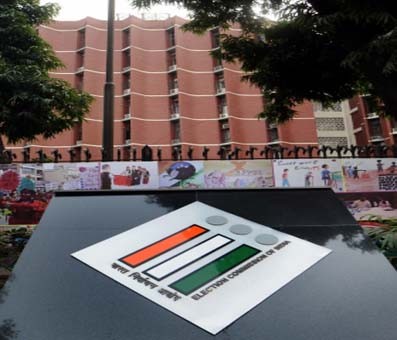
New Delhi, Noting the fact that declarations provided by the political parties about the financial ramifications of poll promises are quite routine and ambiguous, the Election Commission has proposed to mandate the political parties to provide authentic information to the voters to assess the financial viability of their election promises.
While the existing guidelines under the Model Code of Conduct (MCC) require the political parties and candidates to explain the rationale for promises made therein as well as the possible ways and means to finance such promises, Election Commission has observed that the declarations are quite routine, ambiguous and do not provide adequate information to the voters to exercise informed choice in an election.
The Commission, under the guidance of Chief Election Commissioner (CEC) Rajiv Kumar proposed to supplement the existing MCC guidelines and mandate political parties to inform voters about financial ramifications of their promises in the manifesto against well-defined quantifiable parameters.
A senior official of the poll panel said the move was aimed at assessing the feasibility of implementation of such promises within the financial space available.
As per the proposal, the political parties will have to provide the details of the financial feasibility of their promises in a certain format which include information like extent and expanse of coverage; quantification of physical coverage and quantification of financial implications of the promises.
Moreover, the information will also include availability of the financial resources and ways and means of raising resources for meeting the additional expenditure to be incurred in fulfilling the promises.
The EC in its meeting led by CEC Rajiv Kumar and attended by Election Commissioner Anup Chandra Pandey decided that it cannot remain a mute spectator and overlook the undesirable impact of some of the promises and offers, on the conduct of free and fair elections and maintaining level playing field for all political parties and candidates.
Drawing upon his experience in dealing with the Finance Commission, RBI and Budget process as Union Finance Secretary, CEC Rajiv Kumar has initiated yet another major electoral reform for not only bringing about a standardised disclosure proforma for guidance of political parties and candidates, but also ensuring authentic information to the voters to assess financial viability of election promises made by political parties. Proforma seeks details of revenue generation ways (through additional tax, if any), rationalising expenditure (cutting some schemes, if so required), impact on committed liabilities and/or raising of further debt and its impact on FRBM limits.
The Commission noted that the consequences of inadequate disclosures by political parties get attenuated by the fact that the elections are held frequently, providing opportunities for political parties to indulge in competitive electoral promises, particularly in multi-phase elections, without having to spell out their financial implications more particularly on committed expenditure. In any case, these declarations are also not submitted by most of the political parties in time.
The Election Commission has written to all recognised national and state political parties soliciting views for proceeding with the proposed amendment for bringing about a standardized disclosure proforma with the aim of not only strengthening of Model Code of Conduct guidance for political parties and candidates but also ensuring authentic information to the voters to assess financial viability of election promises made by Political Parties. All the national and recognised political parties have been requested to send their views by October 18.


.jpeg)

